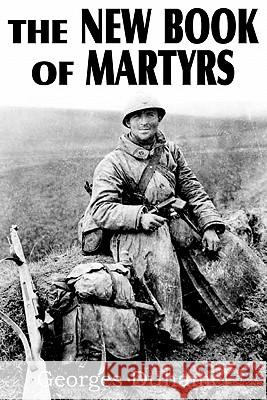The New Book of Martyrs » książka
The New Book of Martyrs
ISBN-13: 9781612031835 / Angielski / Miękka / 2011 / 100 str.
The New Book of Martyrs
ISBN-13: 9781612031835 / Angielski / Miękka / 2011 / 100 str.
(netto: 55,14 VAT: 5%)
Najniższa cena z 30 dni: 57,27
ok. 16-18 dni roboczych.
Darmowa dostawa!
The New Book of the Martyrs is a result of Georges Duhamel's life changing experience as a doctor in World War I. His stories of Carre and Lerondeau, Verdun, The Death of Mercier and others are thought provoking and emotional. "Someone who had been visiting the wounded said to me: "The beds are really very white, the dressings are clean, all the patients seem to be playing cards, reading the papers, eating dainties; they are simple, often very gentle, they don't look very unhappy. They all tell the same story... The war has not changed them much. One can recognize them all." "Are you sure that you recognize them? You have just been looking at them, are you sure that you have seen them? "Under their bandages are wounds you cannot imagine. Below the wounds, in the depths of the mutilated flesh, a soul, strange and furtive, is stirring in feverish exaltation, a soul which does not readily reveal itself, which expresses itself artlessly, but which I would fain make you understand." Georges Duhamel was a French author. Between 1906 and 1909 he founded l'Abbaye de Creteil with Charles Vildrac. The group brought together poets, writers, musicians and painters. From 1912, he became an editor of the literary review Mercure de France. He trained as a doctor, and during World War I worked as an army surgeon for four years. In 1935, he was elected to the 30th chair at the Academie Francaise. During World War II Duhamel's work was banned by the Germans. After the war, Duhamel was named president of the Alliance Francaise and returned to his public speaking."
The New Book of the Martyrs is a result of Georges Duhamels life changing experience as a doctor in World War I. His stories of Carre and Lerondeau, Verdun, The Death of Mercier and others are thought provoking and emotional. "Someone who had been visiting the wounded said to me: "The beds are really very white, the dressings are clean, all the patients seem to be playing cards, reading the papers, eating dainties; they are simple, often very gentle, they dont look very unhappy. They all tell the same story... The war has not changed them much. One can recognize them all." "Are you sure that you recognize them? You have just been looking at them, are you sure that you have seen them? "Under their bandages are wounds you cannot imagine. Below the wounds, in the depths of the mutilated flesh, a soul, strange and furtive, is stirring in feverish exaltation, a soul which does not readily reveal itself, which expresses itself artlessly, but which I would fain make you understand." Georges Duhamel was a French author. Between 1906 and 1909 he founded lAbbaye de Créteil with Charles Vildrac. The group brought together poets, writers, musicians and painters. From 1912, he became an editor of the literary review Mercure de France. He trained as a doctor, and during World War I worked as an army surgeon for four years. In 1935, he was elected to the 30th chair at the Académie Française. During World War II Duhamels work was banned by the Germans. After the war, Duhamel was named president of the Alliance Française and returned to his public speaking.











